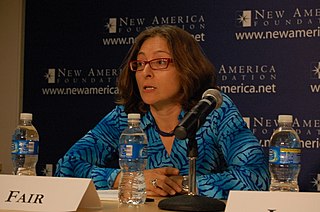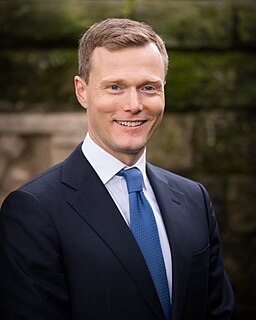Related Research Articles
Neorealism or structural realism is a theory of international relations that emphasizes the role of power politics in international relations, sees competition and conflict as enduring features, and sees limited potential for cooperation. The anarchic state of the international system means that states cannot be certain of other states' intentions and their own security, this prompting them to engage in power politics.
Regime change is the forcible or coerced replacement of one government regime with another. Regime change may replace all or part of the state's most critical leadership system, administrative apparatus, or bureaucracy. Regime change may occur through domestic processes, such as revolution, coup, or reconstruction of government following state failure or civil war. It can also be imposed on a country by foreign actors through invasion, overt or covert interventions, or coercive diplomacy. In addition to replacing one government with another, regime change may entail the construction of new institutions, the restoration of old institutions, and the promotion of new ideologies.
In international relations, power is defined in several different ways. Material definitions of state power emphasize economic and military power. Other definitions of power emphasize the ability to structure and constitute the nature of social relations between actors. Power is an attribute of particular actors in their interactions, as well as a social process that constitutes the social identities and capacities of actors.
International political economy (IPE), also known as global political economy (GPE), is the study of how politics shapes the global economy and how the global economy shapes politics. It is a subfield of economics, political science and international relations. IPE is most closely linked to the fields of macroeconomics, international business, international development and development economics. A key focus in IPE is on the distributive consequences of global economic exchange. It has been described as the study of "the political battle between the winners and losers of global economic exchange."

Robert Kagan is an American neoconservative scholar and critic of U.S. foreign policy and a leading advocate of liberal interventionism.

John Joseph Mearsheimer is an American political scientist and international relations scholar, who belongs to the realist school of thought. He is the R. Wendell Harrison Distinguished Service Professor at the University of Chicago. He has been described as the most influential realist of his generation.

Kenneth Neal Waltz was an American political scientist who was a member of the faculty at both the University of California, Berkeley and Columbia University and one of the most prominent scholars in the field of international relations. He was a veteran of both World War II and the Korean War.

Graham Tillett Allison Jr. is an American political scientist and the Douglas Dillon Professor of Government at the John F. Kennedy School of Government at Harvard University. He is renowned for his contribution in the late 1960s and early 1970s to the bureaucratic analysis of decision making, especially during times of crisis. His book Remaking Foreign Policy: The Organizational Connection, co-written with Peter Szanton, was published in 1976 and had some influence on the foreign policy of the administration of President Jimmy Carter who took office in early 1977. Since the 1970s, Allison has also been a leading analyst of U.S. national security and defense policy, with a special interest in nuclear weapons and terrorism.

Realism is one of the dominant schools of thought in international relations theory, theoretically formalising the Realpolitik statesmanship of early modern Europe. Although a highly diverse body of thought, it is unified by the belief that world politics is always and necessarily a field of conflict among actors pursuing power. The theories of realism are contrasted by the cooperative ideals of liberalism.
Polarity in international relations is any of the various ways in which power is distributed within the international system. It describes the nature of the international system at any given period of time. One generally distinguishes three types of systems: unipolarity, bipolarity, and multipolarity for three or more centers of power. The type of system is completely dependent on the distribution of power and influence of states in a region or globally.

Carol Christine Fair is an American political scientist. She is an associate professor in the Security Studies Program within the Edmund A. Walsh School of Foreign Service at Georgetown University. Her work is primarily focused on counter-terrorism and South Asian topics.

A coup d'état, usually shortened to coup, is the seizure and removal of a government and its powers. Typically, it is an illegal, unconstitutional seizure of power by a political faction, the military, or a dictator. Many scholars consider a coup successful when the usurpers seize and hold power for at least seven days.

Classical Realism is an international relations theory from the realist school of thought. Realism follows the assumptions that: states are the main actors in the international relations system, there is no supranational international authority, states act in their own self-interest and states want power for self-preservation. Classical realism can be differentiated from the other forms of realism since it places specific emphasis on human nature and domestic politics as the key factor in explaining state behavior and the causes of inter-state conflict. Classical realist theory adopts a pessimistic view of human nature and argues that humans are not inherently benevolent but instead they are self-interested and act out of fear or aggression. Furthermore, it emphasizes that this human nature is reflected by states in international politics due to international anarchy.

David S. Painter is an associate professor of international history at Georgetown University. He is a leading scholar of the Cold War and United States foreign policy during the 20th century, with particular emphasis on their relation to oil.
In international relations theory, an audience cost is the domestic political cost that a leader incurs from his or her constituency if they escalate a foreign policy crisis and are then seen as backing down. It is considered to be one of the potential mechanisms for democratic peace theory. It is associated with rational choice scholarship in international relations.
Robert J. Lieber is a Professor of Government and International Affairs at Georgetown University in Washington, D.C. Lieber is the author or editor of a total of seventeen books and has served as the Chair of the Government Department and as Interim Chair of Psychology.

Séverine Autesserre is a French-American author and researcher. She writes about war and peace, peacebuilding, peacekeeping, humanitarian aid, and the ongoing conflict in the Democratic Republic of Congo. Her research has influenced policy interventions as well as scholarly debates on peacebuilding and on Congo. She is a Professor of Political Science at Barnard College, Columbia University, where she specializes in international relations and African studies.

Matthew Kroenig is an American political scientist, author, and national security strategist. He is professor in the Department of Government and the Edmund A. Walsh School of Foreign Service at Georgetown University. Kroenig is best known for his research on international security and nuclear weapons.
Rational choice is a prominent framework in International Relations scholarship. Rational choice is not a substantive theory of international politics, but rather a methodological approach that focuses on certain types of social explanation for phenomena. In that sense, it is similar to Constructivism, and differs from Liberalism and Realism, which are substantive theories of world politics. Rationalist analyses have been used to substantiate realist theories, as well as liberal theories of international relations.
In international relations, credibility is the perceived likelihood that a leader or a state follows through on threats and promises that have been made. Credibility is a key component of coercion, as well as the functioning of military alliances. Credibility is related to concepts such as reputation and resolve. Reputation for resolve may be a key component of credibility, but credibility is also highly context-dependent.
References
- ↑ Dodds, Graham G. (1 December 2014). "The Pathologies of Power: Fear, Honor, Glory, and Hubris in U.S. Foreign Policy by Christopher J. Fettweis. New York". Political Science Quarterly . 129 (4): 717–718. doi:10.1002/polq.12262. ISSN 1538-165X.
- ↑ "Roundtable 7-14 on The Pathologies of Power: Fear, Honor, Glory, and Hubris in U.S. Foreign Policy". International Security Studies Forum . 9 March 2015. Retrieved 6 March 2018.
- ↑ Thies, Cameron G. (December 2012). "Dangerous Times? The International Politics of Great Power Peace. By Christopher J. Fettweis. Washington, DC: Georgetown University Press, 2010. 304p. $29.95. Cosmopolitan Power in International Relations: A Synthesis of Realism, Neoliberalism, and Constructivism. By Giulio M. Gallarotti. New York: Cambridge University Press, 2010. 326p. $29.99". Perspectives on Politics . 10 (4): 1115–1117. doi:10.1017/S1537592712002502. ISSN 1537-5927. S2CID 146813025.
- ↑ "a book review by Daniel S. Feiman: Dangerous Times?: The International Politics of Great Power Peace". New York Journal of Books. Retrieved 6 March 2018.
- ↑ Preble, Christopher A. (2012). "Book Review: Dangerous Times? The International Politics of Great Power PeaceFettweisC. J. (2010). Dangerous Times? The International Politics of Great Power Peace. Washington, DC: Georgetown University Press". Armed Forces & Society . 38 (4): 681–683. doi:10.1177/0095327x12442316. S2CID 147535747.
- ↑ "Dangerous Times? The International Politics of Great Power Peace". Foreign Affairs (May/June 2011). 18 April 2011. ISSN 0015-7120 . Retrieved 6 March 2018.
- ↑ Reeder, Bryce W. (2011). "Dangerous Times? The International Politics of Great Power Peace, by Christopher J. Fettweis". The Journal of Slavic Military Studies . 24 (4): 709–711. doi:10.1080/13518046.2011.624860. S2CID 142788894.